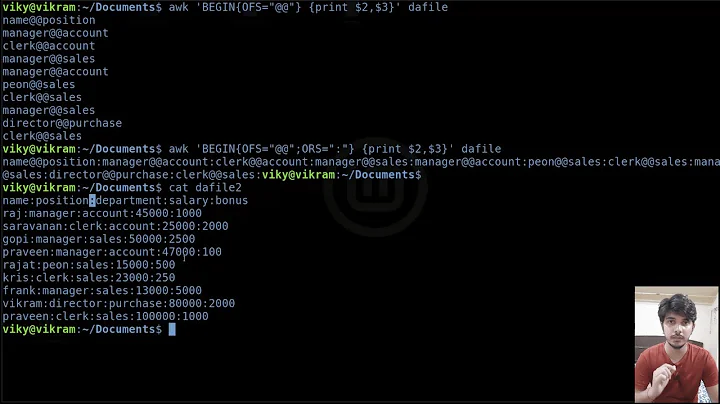How to use sort on an awk print command?
Solution 1
you can add | sort -k2 to your command. This will sort alphabetically based on the second column.
Example:
$ echo "Lebron James 23
Kevin Durant 35
Kobe Bryant 24
Blake Griffin 32
Dikembe Mutumbo 55" | sort -k2
results in
Kobe Bryant 24
Kevin Durant 35
Blake Griffin 32
Lebron James 23
Dikembe Mutumbo 55
Solution 2
Although I wouldn't recommend it (given the relative simplicity of piping the result through an external sort command) you can do this at least with recent versions of GNU awk (at least 4.0 IIRC), as described at Sorting Array Values and Indices with gawk
Here's how you could implement it, assuming you have the data in an associative array in which the index is Firstname Lastname. First you need to define a custom comparison function that splits the index, compares first on Lastname then (as a tie breaker) on Firstname e.g.
function mycmp(ia, va, ib, vb, sa, sb) {
if(split(toupper(ia), sa) && split(toupper(ib), sb)) {
if(sa[2] < sb[2]) return -1;
else if (sa[2] > sb[2]) return 1;
else {
# compare first names
if(sa[1] < sb[1]) return -1;
else if (sa[1] > sb[1]) return 1;
else return 0;
}
}
else return 0;
}
Now you can use the PROCINFO["sorted_in"] array sorting method mentioned in comments by @zwets
PROCINFO["sorted_in"] = "mycmp";
for(i in a) print i, a[i];
Putting it together
#!/usr/bin/gawk -f
function mycmp(ia, va, ib, vb, sa, sb) {
if(split(toupper(ia), sa) && split(toupper(ib), sb)) {
if(sa[2] < sb[2]) return -1;
else if (sa[2] > sb[2]) return 1;
else {
# compare first names
if(sa[1] < sb[1]) return -1;
else if (sa[1] > sb[1]) return 1;
else return 0;
}
}
else return 0;
}
{
a[$1" "$2] = $3;
}
END {
PROCINFO["sorted_in"] = "mycmp";
for(i in a) print i, a[i];
}
Testing:
$ ./namesort.awk yourfile
Kobe Bryant 24
Kevin Durant 35
Blake Griffin 32
Lebron James 23
Dikembe Mutumbo 55
In lesser or older versions of awk, your best bet may be to store the data indexed by Lastname Firstname instead, sort with the conventional asorti, then split and swap the fields of the indices as you traverse the array to print it:
awk '
{a[$2" "$1]=$3}
END {
n=asorti(a,b); for (i=1;i<=n;i++) {split(b[i],s); print s[2], s[1], a[b[i]]}
}' yourfile
Solution 3
To sort only by the whitespace separated second field, use key -k2,2:
... | sort -k2,2
by default sort does the sorting lexicographically.
Note that, if you don't mention the last field for the sorting key i.e. if you just use -k2 then you might not get the desired result as this will sort according to all fields starting from second.
Also check man sort.
Solution 4
Try
awk -f myscript.awk | sort -k2
Where myscript.awk contains purely awk commands.
If your actual script is a shell script, you have several options including
- Pipe output through sort.
./myscript.bash | sort -k2 Rewrite code as a function inside the script
Instead of$ cat t1 #!/bin/bash for i in 2 4 3 1 5; do echo $i done $ ./t1 2 4 3 1 5Do
$ cat t2 #!/bin/bash function foo { for i in 2 4 3 1 5; do echo $i done } foo | sort $ ./t2 1 2 3 4 5
But note you can also apply the sort to the do...done structure instead of making a function.
do
echo $i
done | sort
Solution 5
To sort your data to print:
Suppose you want to print 2nd field (whitespace separated) use this:
awk '{print $2}' data.txt | sorte.g.:
$cat>data.txt 1 Kedar 20 2 Amit 30 3 Rahul 21 ^C $awk '{print $2}' | sort Amit Kedar RahulIf you want to print the whole of your
data.txtbut sorted on column 2, then:$awk '{print}'|sort -k2 2 Amit 30 1 Kedar 20 3 Rahul 21
Use this logic(s) in your requirement.
You may use man sort for more interesting features of sort.
Related videos on Youtube
Anonymous
Updated on September 18, 2022Comments
-
 Anonymous over 1 year
Anonymous over 1 yearI have a couple of commands in an awk script I'm writing:
print "Here are some players and their numbers, sorted by last name" if(sum[x] > 500) {print x, $2}Which outputs:
Here are some players and their numbers, sorted by last name Lebron James 23 Kevin Durant 35 Kobe Bryant 24 Blake Griffin 32 Dikembe Mutumbo 55How can I use the
sortcommand in my awk script to sort the players and their numbers ONLY?-
 zwets over 7 yearsGiven your comments on the answers, you seem to be confusing awk and shell script in your question. It seems that you wish to do the sorting within your awk script, not in the shell script invoking it. If that is correct, then please edit your question and replace the two occurrences of 'shell' by 'awk'. On a separate note: yes, awk has a sorting facility, but it is quite involved: you must store all lines in an array, keyed on their second field, which you'll need to extract from
zwets over 7 yearsGiven your comments on the answers, you seem to be confusing awk and shell script in your question. It seems that you wish to do the sorting within your awk script, not in the shell script invoking it. If that is correct, then please edit your question and replace the two occurrences of 'shell' by 'awk'. On a separate note: yes, awk has a sorting facility, but it is quite involved: you must store all lines in an array, keyed on their second field, which you'll need to extract fromx, then setPROCINFO["sorted_in"]to a cryptic value, then output the array. I wouldn't go there. -
 zwets over 7 yearsI mean: I wouldn't go there given the simplicity of
zwets over 7 yearsI mean: I wouldn't go there given the simplicity of... | sort -k2,2. -
 Anonymous over 7 years@zwets How would I implement
Anonymous over 7 years@zwets How would I implement...| sort -k2,2if there are other lines that need to be printed? Check edited question. -
 zwets over 7 yearsBy
zwets over 7 yearsByecho-ing the header line from the shell, then run theawk | sortpipeline.
-
-
 Anonymous over 7 yearsUnfortunately I'm using a script, and the sort command will be mashed up with many other outputs. Is there a way to sort the output of
Anonymous over 7 yearsUnfortunately I'm using a script, and the sort command will be mashed up with many other outputs. Is there a way to sort the output of{print x, $2}directly in the script code? I'm getting an error when pipingif(sum[x] > 500) {print x, $2} | sort -k2. -
 Anonymous over 7 yearsPlease check comment on Wayne's post for what I need
Anonymous over 7 yearsPlease check comment on Wayne's post for what I need -
 David Foerster over 7 years@KMoy:
David Foerster over 7 years@KMoy:if(sum[x] > 500) {print x, $2}is Awk code while| sort -k2is a shell command. Obviously you can't mix the two like that because they're different languages. Instead you need to apply thesortcommand to the output of the Awk interpreter that runs your Awk code snippet. If you don't know what I mean please expand your question to give us the full picture. -
Wayne_Yux over 7 yearsYou are writing a shell script, right? Then you have two option: 1. run
./my-script.sh | sort -k2. 2. add ` | sort -k2` to the line of your script that produces the output given in your question. -
 Anonymous over 7 years@Wayne_Yux Please check edits made to original question.
Anonymous over 7 years@Wayne_Yux Please check edits made to original question. -
Wayne_Yux over 7 yearsThen you probably need the answer from @steeldriver
-
 zwets over 7 yearsWhy define the function?
zwets over 7 yearsWhy define the function? -
 RedGrittyBrick over 7 years@zwets, it makes it easier to feed the results of arbitrary code, including looping control structures, through a pipeline. There are cases where it is unnecessary but I find it a useful general pattern. I'll edit my answer to demonstrate this.
RedGrittyBrick over 7 years@zwets, it makes it easier to feed the results of arbitrary code, including looping control structures, through a pipeline. There are cases where it is unnecessary but I find it a useful general pattern. I'll edit my answer to demonstrate this.






